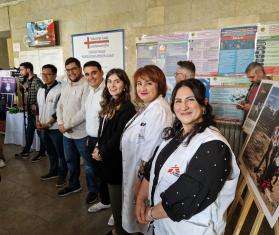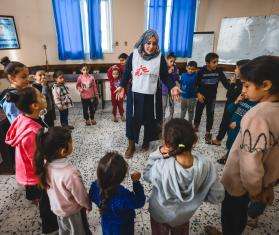SUMMARY
For much of the past few decades, the Democratic Republic of Congo (DRC) has been dealing with numerous, often overlapping emergencies, as persistent instability in its eastern provinces and recurrent strife in other regions have led to recurring humanitarian crises and outbreaks of disease.
As of December 2013, conflict had driven nearly three million people from their homes, according to United Nations estimates, roughly 90 percent of them residents of North Kivu, South Kivu, Orientale, and Katanga provinces in the country’s easternmost reaches. Many go into hiding in forest or scrublands, struggling to obtain food and drinking water well beyond the reach of humanitarian organizations and medical care. People wounded by fighting go untreated, and outbreaks of diseases such as malaria, cholera, and measles occur year after year.
VIDEO: Out of Sight, Out of Reach in DR Congo
These dynamics have led to the deaths of huge numbers of people, and will continue to do so unless something changes. And yet efforts to address the region’s profound medical emergencies are consistently stymied by insecurity, a lack of resources, a lack of initiative, and a refusal by the principals in the conflict to allow aid groups to deliver assistance.
Among the area’s revolving cast of armed groups, observance of humanitarian principles and respect for the neutrality of medical facilities is nominal and fleeting at best; little effort is made to distinguish between civilians and combatants. MSF has seen armed men enter hospitals and harass patients; clinics abandoned as medical staff flee violence; health facilities looted and health workers threatened; patient records confiscated in violation of patient confidentiality.
VIDEO: DR Congo: Africa's Deadliest Conflict
Meanwhile, a heavily armed United Nations intervention brigade (MONUSCO) has been authorized to confront and engage armed groups that oppose the authority of the state. This seriously compromises the perception of humanitarian and medical aid as an impartial activity, because these offensive operations by the UN are being carried out in transports that resemble those of humanitarian organizations.
What’s more, most aid organizations are heavily concentrated in urban centers and operate within an inflexible humanitarian system that does not allow rapid, effective responses to critical situations. They are conspicuously absent in remote, rural areas where the majority of the population lives. The aid that is delivered therefore goes largely to those people who manage to reach camps near urban centres. Even then, however, assistance is too often irregular and insufficient.
The national health system theoretically guarantees free health care in the case of emergency, but the authorities in eastern DRC have proven unable to deliver on this promise. Patients are expected to pay for every aspect of medical care, and the national health care system—and many health programs run by non-governmental organizations—are based on a cost recovery system. This is in a region where the vast majority of people live on less than $2 per day, and only one in four lives within three miles of a health facility. A pregnant woman facing obstructed labor, for instance, can expect to pay upwards of $50 for a lifesaving Caesarean section—if she can reach a medical facility in the first place.
VIDEO: Everyday Emergency in DRC: Displacement
This Doctors Without Borders/Médecins Sans Frontières (MSF) report, Everyday Emergency: Silent Suffering in the Democratic Republic of Congo, uses medical data from MSF projects and testimonies of patients and staff to illustrate the true and unrelenting nature of the medical and humanitarian emergency that is now routine in many parts of DRC, especially in the east
Much of this human suffering could be prevented. There are a number of principles that could, if they were widely and consistently adopted by armed groups, humanitarian organizations, state authorities, and the United Nations, help reduce unnecessary deaths and improve the lives of people in eastern DRC. Among them are:
Respect for civilians, humanitarians and medical facilities
Civilians must not be harmed
In MSF’s experience, armed groups and militias appear not to distinguish between civilians and combatants. MSF has seen the consequences of abuse, harassment, targeted attacks, counter-attacks, and massacres carried out by a variety of armed groups on civilians. MSF urges respect for civilians and for humanitarian and medical facilities from all armed groups, including MONUSCO and the Congolese army. The neutrality of humanitarian action must be respected by all parties to the conflict, including the UN. A first step would be to clearly distinguish all military assets from civilian functions.
Medical facilities must be respected
According to international humanitarian law, the sick and the injured are not combatants. Medical staff must be able to act impartially and make decisions about the delivery of care solely on medical grounds. The places where they work—ambulances, mobile clinics, health posts, and hospitals—must be safe, neutral spaces, their neutrality recognized and respected by all armed groups, including MONUSCO, the new UN intervention brigade and the Congolese army.
Better humanitarian aid provision
Focus on needs
The provision of humanitarian assistance in DRC should be timely, flexible and appropriate, especially in emergencies. Aid should be provided based on people’s actual needs, rather than on their location or on any kind of political agenda.
Reach out to the “hidden” displaced
More efforts must be made to reach the large numbers of “hidden” displaced people. Temporarily living with host families or hiding in forests and fields, they are a highly vulnerable group whose needs are too frequently neglected by humanitarian organizations that too often focus on providing services to people in camp settings and in urban areas.
Remove financial barriers to health care and improve response to disease epidemics
Stop making vulnerable patients pay for health care
Making people pay even a small fee for health care in DRC prevents many of the most vulnerable from accessing health services, particularly in areas affected by conflict. Health providers in DRC, particularly those with programs in conflict-affected regions, must act to reduce financial barriers for patients.
Improve and augment epidemic prevention and response
In addition to comprehensive routine immunizations and better health care infrastructure in DRC, there needs to be greater transparency and accountability when reporting coverage rates and better cooperation when faced with a disease outbreak.
MSF does not dispute the fact that it can be difficult to work in DRC, especially in the east, or that the issues involved are complex and far-reaching. But over time, MSF projects have reached hundreds of thousands of people who would not have otherwise received medical care. This shows that it can be done, but MSF is under no illusions; it is not nearly enough to address the needs of people who have lived amidst strife and without meaningful assistance for far too long.





